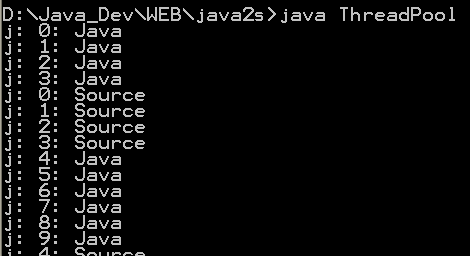Very basic implementation of a thread pool

/*
* Copyright (c) 2004, Rob Gordon.
*/
// revised from oddjob
import java.util.LinkedList;
/**
* Very basic implementation of a thread pool.
*
* @author Rob Gordon.
*/
public class ThreadPool {
private BlockingQueue queue = new BlockingQueue();
private boolean closed = true;
private int poolSize = 3;
public void setPoolSize(int poolSize) {
this.poolSize = poolSize;
}
public int getPoolSize() {
return poolSize;
}
synchronized public void start() {
if (!closed) {
throw new IllegalStateException("Pool already started.");
}
closed = false;
for (int i = 0; i < poolSize; ++i) {
new PooledThread().start();
}
}
synchronized public void execute(Runnable job) {
if (closed) {
throw new PoolClosedException();
}
queue.enqueue(job);
}
private class PooledThread extends Thread {
public void run() {
while (true) {
Runnable job = (Runnable) queue.dequeue();
if (job == null) {
break;
}
try {
job.run();
} catch (Throwable t) {
// ignore
}
}
}
}
public void close() {
closed = true;
queue.close();
}
private static class PoolClosedException extends RuntimeException {
PoolClosedException() {
super ("Pool closed.");
}
}
}
/*
* Copyright 2004, Rob Gordon.
*/
/**
*
* @author Rob Gordon.
*/
class BlockingQueue {
private final LinkedList list = new LinkedList();
private boolean closed = false;
private boolean wait = false;
synchronized public void enqueue(Object o) {
if (closed) {
throw new ClosedException();
}
list.add(o);
notify();
}
synchronized public Object dequeue() {
while (!closed && list.size() == 0) {
try {
wait();
}
catch (InterruptedException e) {
// ignore
}
}
if (list.size() == 0) {
return null;
}
return list.removeFirst();
}
synchronized public int size() {
return list.size();
}
synchronized public void close() {
closed = true;
notifyAll();
}
synchronized public void open() {
closed = false;
}
public static class ClosedException extends RuntimeException {
ClosedException() {
super("Queue closed.");
}
}
}
Related examples in the same category